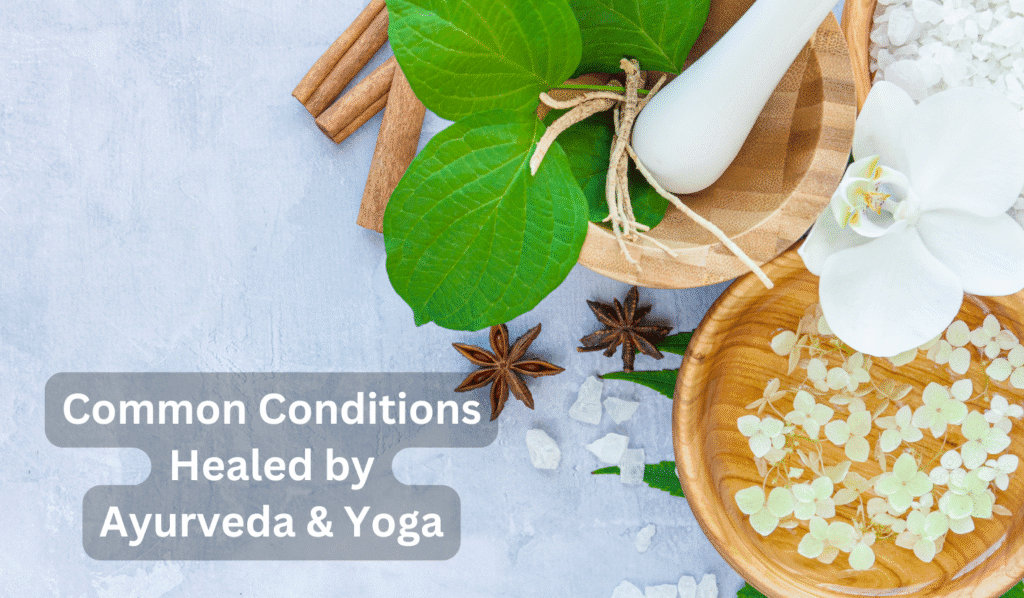Ayurveda and Yoga provide a comprehensive approach to healing that addresses the mind, body, and the spirit. At Shantitheeram Ayurveda – Lakeside Heritage Resort, recognized as the best Ayurveda center and best Panchakarma center, we specialize in integrating these two powerful practices to provide the best Ayurveda treatment for a variety of health conditions. In this blog, we explore some conditions that can be effectively managed and treated through the synergistic power of Ayurveda and Yoga.
1. Stress and Anxiety
Ayurvedic Perspective: Stress and anxiety are seen as imbalances in the Vata dosha, which can disrupt the nervous system and mental clarity.
Treatment Approach: The best Ayurveda treatment for stress and anxiety involves calming therapies like Shirodhara (oil therapy), Abhyanga (full-body massage), and herbal remedies such as Ashwagandha and Brahmi. Yogic practices like Pranayama (breathing exercises) and meditation help calm the mind and reduce anxiety.
2. Digestive Disorders
Ayurvedic Perspective: Digestive issues, including indigestion, bloating and constipation, are often due to an imbalance in the Pitta dosha.
Treatment Approach: Panchakarma treatments like Virechana (purgation) and Basti (enema) cleanse the digestive system. Herbal formulations such as Triphala and dietary adjustments are also recommended. Yoga asanas like Vajrasana and Pavanamuktasana aid in digestion and improve gut health.
3. Chronic Fatigue Syndrome (CFS)
Ayurvedic Perspective: CFS is linked to an imbalance in all three doshas (Vata, Pitta, and Kapha), leading to energy depletion and manifesting in persistent fatigue.
Treatment Approach: Rejuvenating therapies like Rasayana (rejuvenation) treatments and Ashwagandha-based formulations help restore vitality. Yoga Nidra (yogic sleep) and restorative yoga poses enhance energy levels and combat fatigue.
4. Skin Disorders
Ayurvedic Perspective: Skin conditions like eczema, psoriasis, and acne are often caused by an imbalance in the Pitta dosha.
Treatment Approach: Shantitheeram – the best Panchakarma center with authentic ayurvedic treatments – offers detoxification procedures such as Virechana. Neem, Turmeric, and Aloe Vera are commonly used herbs. Yoga practices that promote blood circulation and detoxification, like Surya Namaskar (Sun Salutation), are beneficial.
5. Arthritis and Joint Pain
Ayurvedic Perspective: Arthritis and joint pain are often due to an imbalance in the Vata dosha, leading to stiffness and inflammation.
Treatment Approach: Ayurvedic therapies like Abhyanga with medicinal oils, herbal formulations like Guggul, and dietary changes help manage symptoms. Yoga poses that improve flexibility and strength, such as Trikonasana (Triangle Pose) and Tadasana (Mountain Pose), are recommended.
6. Diabetes
Ayurvedic Perspective: Diabetes, or Madhumeha, is primarily linked to an imbalance in the Kapha dosha and poor digestive fire (agni).
Treatment Approach: Herbal treatments like Karela (bitter melon), Gudmar (Gymnema Sylvestre) and Jamun (black plum) are effective. Panchakarma therapies like Vamana (emesis) and Basti help regulate blood sugar levels. Yoga asanas like Dhanurasana (Bow Pose) and Ardha Matsyendrasana support pancreatic function and insulin sensitivity.
7. Obesity
Ayurvedic Perspective: Obesity is seen as a Kapha dosha imbalance, leading to the accumulation of excess fat and sluggish metabolism.
Treatment Approach: The best Ayurveda treatment includes Udvartana (herbal powder massage) and detoxification therapies. Herbs like Guggul and Triphala aid weight loss. Yoga practices such as Surya Namaskar and dynamic asanas boost metabolism and burn fat.
8. Hypertension
Ayurvedic Perspective: Hypertension, or high blood pressure, is often related to imbalances in the Pitta and Vata doshas.
Treatment Approach: Stress management through Shirodhara and meditation, along with herbal remedies like Sarpagandha, help regulate blood pressure. Yoga practices like Savasana (Corpse Pose) and slow Pranayama help calm the mind and reduce stress.
9. Asthma
Ayurvedic Perspective: As per ayurveda, asthma is linked to an imbalance in the Kapha and Vata doshas, causing respiratory issues.
Treatment Approach: Herbal treatments with Vasaka and Tulsi, along with Panchakarma therapies like Nasya (nasal administration), are effective. Yoga asanas that open the chest and improve lung capacity, such as Bhujangasana (Cobra Pose) and Matsyasana (Fish Pose), are recommended.
10. Insomnia
Ayurvedic Perspective: Insomnia is often caused by an imbalance in the Vata dosha, affecting the nervous system.
Treatment Approach: Shantitheeram as a part of authentic ayurveda treatment offers therapies like Shirodhara and recommends herbal teas with Ashwagandha and Brahmi. Yoga practices, including restorative poses and Pranayama, promote relaxation and improve sleep quality.
11. Menstrual Disorders
Ayurvedic Perspective: Menstrual issues like irregular periods and menstrual cramps are often due to imbalances in the Vata and Pitta doshas.
Treatment Approach: Ayurvedic treatments with herbs like Shatavari and Ashoka, along with Panchakarma therapies, regulate menstrual cycles. Yoga poses like Supta Baddha Konasana (Reclining Bound Angle Pose) and gentle stretches ease menstrual discomfort.
12. Thyroid Disorders
Ayurvedic Perspective: Thyroid imbalances are often linked to Kapha and Pitta dosha imbalances, affecting metabolism and energy levels.
Treatment Approach: Ayurvedic therapies include herbal treatments with Guggul and Kanchanar Guggulu, along with detoxification therapies. Yoga practices like Sarvangasana (Shoulder Stand) and Ustrasana (Camel Pose) stimulate thyroid function.
13. Migraines
Ayurvedic Perspective: Migraines are often related to an imbalance in the Pitta and Vata doshas, causing severe headaches.
Treatment Approach: Shantitheeram provides therapies like Nasya and Shirodhara to manage migraines. Herbal treatments with Jatamansi and Brahmi are used. Yoga practices, including Pranayama and gentle stretches, help alleviate migraine symptoms.
14. PCOS (Polycystic Ovary Syndrome)
Ayurvedic Perspective: PCOS is associated with imbalances in the Kapha and Vata doshas, leading to hormonal imbalances.
Treatment Approach: Ayurvedic treatments include herbal formulations like Triphala and dietary adjustments. Panchakarma therapies like Virechana are beneficial. Yoga poses that focus on the abdomen and pelvic area, such as Bhujangasana and Navasana (Boat Pose), are recommended.
15. Depression
Ayurvedic Perspective: Depression is linked to imbalances in the Vata and Kapha doshas, affecting mental and emotional health.
Treatment Approach: The best Ayurveda treatment includes therapies like Shirodhara, Abhyanga, and herbal formulations with Brahmi and Ashwagandha. Yoga practices, including mindfulness, meditation, and restorative asanas, promote mental well-being and emotional balance.
Conclusion
At Shantitheeram Ayurveda, we believe in the profound healing potential of Ayurveda and Yoga. Our treatments are tailored to each individual’s unique constitution and health needs, ensuring a holistic approach to wellness. Recognized as the best Ayurveda center and best Panchakarma center, we offer a sanctuary where ancient wisdom meets modern expertise. Embrace the power of Ayurveda and Yoga to transform your health and well-being.

